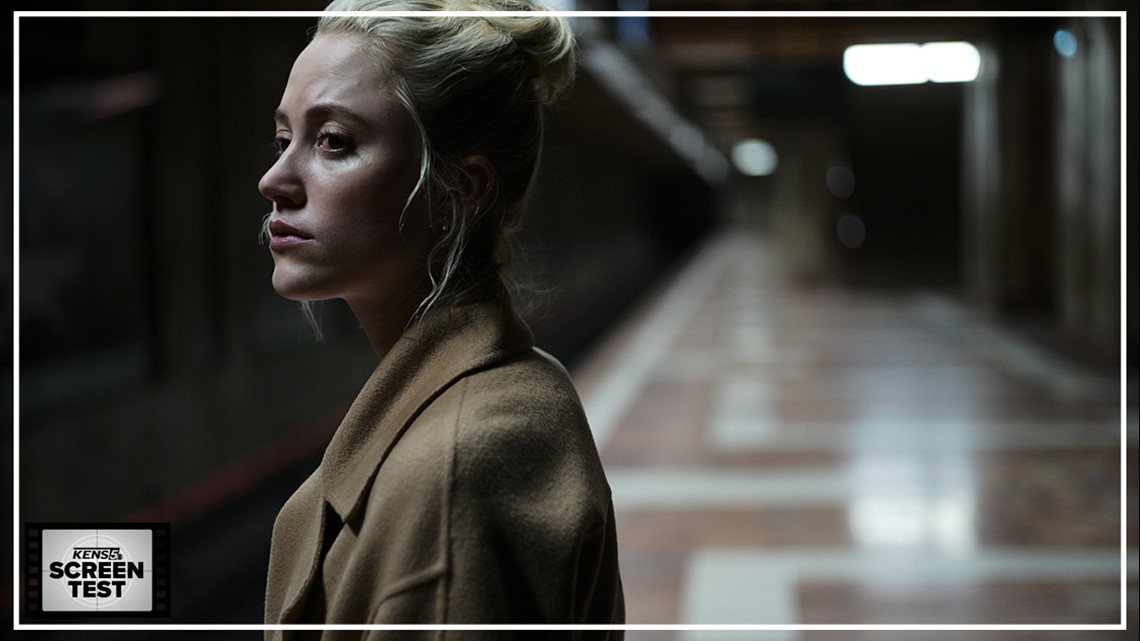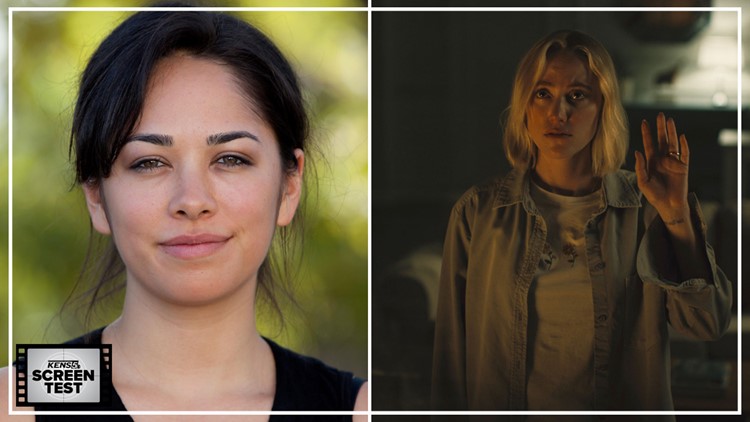SAN ANTONIO — Uneasiness is drawn from primal places in “Watcher,” writer-director Chloe Okuno’s nightmare of a feature debut that turns the simple image of a man’s shadowed outline into a boiling pot of psychological desperation.
There’s power in a gaze, a truth that both suspenseful yarns (“Rear Window”) and sweeping romances (“Portrait of a Lady on Fire”) have made evident. And while “Watcher” is aesthetically far more in the lineage of Hitchcock than Sciamma, its conceit of a young couple splitting at the seams after relocating overseas to a gothic Bucharest neighborhood is underscored as much by domestic dangers as mortal ones.
Eight years after she was terrorized by unabating external forces in “It Follows,” a similar threat haunts and taunts rising genre cinema star Maika Monroe’s Julia in “Watcher.” Whether the shrugging-off of her concerns is as potentially dangerous as the strange figure peering into her apartment from across the street every night (the stalker is played by a hellishly good Burn Gorman) is a question that evolves over the course of “Watcher,” a movie that unabashedly limits the viewer’s own perspective with consistent streams of unsubtitled Romanian dialogue and atmosphere heavy enough to extinguish a wildfire.
In a genre that for years has considered the line between phantom terrors and real ones, “Watcher” breaks through it. Playing off the simple-premise, heavyweight-mood strategy of some of the most claustrophobic thrillers of the ‘60s and ‘70s, the movie finds Okuno endeavoring to make as much of a statement on moviegoing conventions as on cultural displacement.
Having slithered its way through Sundance and South By Southwest, “Watcher” opens in theaters Friday. Ahead of its release, KENS 5 critic David Lynch sat down for a Zoom conversation with Okuno and Monroe about their collaboration, creating dread through disquiet and letting the audience peer through a door that’s rarely ever more than cracked.
This interview has been edited for clarity.
---
David Lynch: I don't know if either of you are on Letterboxd, but one of the top reviews on there for "Watcher" reads, short and sweet, "Never wave." Were you aware of that?
Maika Monroe: (laughs)
Chloe Okuno: I never read Letterboxd reviews, I have not read every single one and memorized most of them. So... yes, I'm being very sarcastic, I know that one and have read it (laughs).
It's a funny takeaway from "Watcher." But I do think it ties into when, for example, the character of Irina tells Julia that maybe the best outcome of her situation is that she just lives with the uncertainty. Chloe, to what extent did you and (cowriter) Zack Ford set out to make a movie about the line that separates observing horror and evil and crossing it into actually acknowledging and confronting that horror?
Okuno: You know, I feel like because it's clearly a little bit of a riff off of "Rear Window," there is some DNA just built into the script already, which is about a sort of slightly meta layer of we – or I, as a filmmaker – as the sort of voyeuristic lens that is capturing a story about a woman who feels like she's being watched. I had always felt really strongly that the way for Julia in the story to reclaim her power as the object of this man's gaze is to turn that gaze back around on him. I think the meta part of it is kind of interesting, but I always try to root things a little bit more in the emotion of the character.
Even though I like the meta interpretation of it, it was more important that it's just a human reaction. Like, if Julia were in this circumstance, if I were in this circumstance, you know, for some people, it's like, "That's insane, why would you follow the person who's stalking you?" But I hope that you kind of realize at a certain point (that) she's not safe anywhere, she feels the eyes of this man on her constantly. And I think it's probably bolstered by, just generally, the feeling of being a woman and feeling like you have the eyes of the world upon you constantly and the only way to sort of take that back is to look back at someone and to be active. To be not the aggressor, but at least to just reclaim some level of power.
Maika, you've been involved in plenty of genre work over the last decade, and mixed in with that you've had a handful of movies in which your performances aren't always being reciprocated by who you're interacting with in the traditional way, where things may be a little bit more one-sided. I'm thinking of the early scenes in "Watcher," I'm also thinking about your character in "Tau" with the AI. I'm thinking about "It Follows," because the follower is literally just following with a dead stare on their face. What is it about those kinds of roles that interests you?
Monroe: I was really lucky to be a part of "It Follows." I think "It Follows" was the beginning of this change in the horror genre; it came out at a similar time as "The Witch" and "The Babadook." I think that, finally, the genre of horror, it's really elevated and there's such interesting characters where I feel like there was a period of time that horror was just, you know, sexy girls covered in blood and sex and everyone's dying. And I think that there's been a real shift to these incredibly deep, layered characters.
Obviously part of it is just luck and I'm sent scripts and I'll connect with certain things. But I think, especially with "Watcher," I just read it and as a female I've experienced that sort of feeling so many times, and to see it being told in this elevated, suspenseful kind of fun story, I just fell in love with it.
The movie lets its audience know as early as it possibly can that there won't be any subtitles, they're just going to have to live with the mystery that comes with being culturally displaced like Julia is. For both of you, how did you find that balance of alienating the audience while also making sure that they stay invested in what's happening to Julia and the decisions that she makes?
Okuno: With the subtitles aspect of it, I really like that we're putting people into Julia's point of view; they can't understand because she can't understand. I've had that experience before, and I knew how intensely frustrating that can be and how isolating and alienating it is.
At the same time, I feel like most of what's being said around her, I hope, can sort of be intuited from the circumstances. It's not like there's any truly crucial piece of information that you're missing if you don't read the subtitles. I think it's more of a general emotional feeling of, like, you're at a dinner table, your husband is speaking in this foreign language, you know, before you've been talking about the serial killer, and now people are making jokes—what does that mean? Again, I hope it's things that are pretty obvious what you suspect people are saying, but you don't know for 100% certain and that's the worst part of it. That was the balance that we tried to find.
Maika, what kinds of challenges did that pose to you? Did you do anything different to sink into this performance of slowly creeping dread and anxiety and also even anger with your character?
Monroe: We were lucky, we had about a week of rehearsals before shooting, which I think was really crucial and super helpful. But we were shooting out of order, so some days we'll be shooting the last scene up first, and then we go back to filming, so I just had to make sure that I was really aware of what was happening, what had just happened before the scene we were shooting and what was about to happen so it'll all be very cohesive. But yeah, it's a challenge.
It's funny, the horror genre is probably one of the most challenging for me, because it's really intense scenes and very emotional. Almost every day, there's going to be a scene that's really emotional and really intense. Chloe is just incredible and created such a safe space on set for me to really go there. Which I was just very grateful for.
One of the things I remember you saying after the South By Southwest screening, Chloe, was you mentioned the first time, I believe, that Burn and Maika met was in that late subway scene. Is that right?
Okuno: It wasn't the first time they met, they had done actually quite a few scenes together. But it was the first scene in which Burn, his character, speaks to Maika. First one in which they actually open their mouths and have a conversation. That was, for me, such an amazing day. I really did feel like this movie in a lot of ways is kind of building up to this scene, to the moment she confronts this guy.
And it's a scene that's pretty relatively subtle, and there's a lot of things happening. I always sort of felt like the movie in a lot of ways rests on the ability to execute the scene properly. So when they shot it, you know, it was like the moment when I felt like the movie would work, because Burn was so great and because Maika was so incredible, and the way they worked off of each other as actors was just really special. I think it's definitely my favorite scene in the movie.


A blunt question: Why Romania? Do either of you have any experience with it, was it written that way?
Okuno: Because the producers, I think, felt strongly that it would help our limited budget to shoot there. I'm not gonna lie, it was a very financially driven decision. But that being said, it was also (that) the producers had experience working in Bucharest before and they have a very strong infrastructure, they have really good crews. It ended up being a great place for us to make it, because it did help push our very limited budget very far. But also, all of our crew was local, except for me, the producers and my DP, and they were all so fantastic. And Bucharest as a city looks really unique and beautiful; it just ended up bringing so much to it. So it was sort of a practical decision that became very creatively inspirational.
We've had horror movies about relationships for as long as we've had horror movies, but it feels like we're in a pretty big wave of them right now. Maika, you alluded to that, and I think the anxiety and ambiguity of Julia and Francis' relationship fits into that. I'm curious what you both think it is about rooting horror films in relationships that is and remains so compelling.
Okuno: Because relationships are horrible (laughs).
Monroe: Yeah, they're really something (laughs).
Okuno: I mean, I do think there's probably some truth to that though. Some people don't like it when horror is a metaphor, but horror just taps into emotions that I think can be difficult to express sometimes. So I feel like it's a good way to express things that you feel, and (laughs) there's no worse feeling than being in a relationship that's having problems.
---
"Watcher" opens in some San Antonio theaters Friday, and will be available to stream on Shudder later this year.



